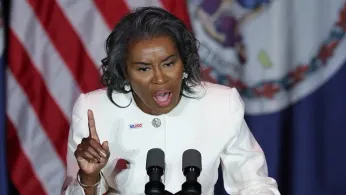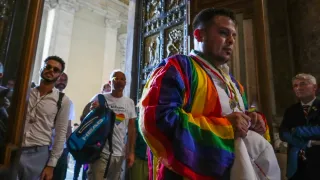
Sep 7
Winsome Earle-Sears Employs Anti-Transgender Rhetoric in Bid Against Abigail Spanberger
READ TIME: 3 MIN.
As Virginia’s gubernatorial race enters its final stretch, Republican candidate and current Lieutenant Governor Winsome Earle-Sears has sharpened her focus on issues related to transgender rights, casting her opponent Abigail Spanberger as “radical” on gender identity and school inclusion policies. Earle-Sears’ campaign recently released a television advertisement accusing Spanberger of supporting “men in girls’ sports, bathrooms and locker rooms” and opposing parental notification when children come out as transgender at school. The ad frames Spanberger’s positions as out of step with Virginia voters and labels her “for they, them, not for us” .
This messaging comes as early voting is set to begin on September 19. Recent polling suggests the race has tightened, with both candidates seeking to define each other in the minds of voters before their only scheduled debate .
Earle-Sears’ positions echo a broader national Republican trend of using transgender rights—especially as they relate to youth and public schools—as a wedge in political campaigns. In multiple interviews and campaign events, Earle-Sears has committed to signing legislation that would require Virginia public schools to designate single-sex bathrooms and locker rooms and ban transgender girls from participating in girls’ sports. She has further argued that failing to enact such policies is driving parents away from public schools, fueling a push for expanded school choice options .
In a televised interview, Earle-Sears stated, “If don’t , I will sign legislation forcing them to” . She further cited these issues as justification for parents seeking alternatives to public education, including private and parochial schools or homeschooling.
Abigail Spanberger, the Democratic nominee and former U.S. Representative, has consistently supported the inclusion of transgender students in school activities and opposed efforts to restrict access to bathrooms or sports teams based on gender identity. Spanberger argues that such decisions should be left to families, school staff, and local athletic associations, rather than dictated by politicians. “Federal and state level policies banning transgender students from some sports teams are throwing out a process that was driven by parents, teachers and coaches,” Spanberger said in a recent interview .
Earle-Sears’ campaign has not been limited to issues of transgender inclusion in schools. Last year, she attached a handwritten note expressing moral opposition to a bill prohibiting discrimination in marriage licensing on the basis of sex, gender, or race—a move that drew criticism from LGBTQ+ rights groups and highlighted the ongoing ideological rift within the Republican Party on LGBTQ+ rights .
The controversy intensified when the Republican ticket was embroiled in a separate incident involving the resignation of a lieutenant governor nominee who was the first openly gay statewide candidate in Virginia’s history. Democratic leaders seized on Earle-Sears’ opposition to LGBTQ+ rights, with a spokesperson for the Democratic Party of Virginia stating, “Virginians deserve a governor who will fight to protect their rights and freedoms, and it’s crystal clear Sears won’t do that” .
With early voting set to begin and the general election scheduled for November 4, the race remains highly competitive. Spanberger continues to lead in most polls but faces a narrowing margin as Earle-Sears’ campaign leans heavily into culture war issues . The outcome will likely have a significant impact on the future of LGBTQ+ rights in Virginia, with advocates warning that the stakes are especially high for transgender youth and their families.






